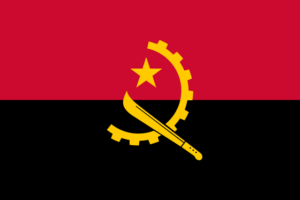
Region: Africa
Disability Definition
Persons with disabilities are all those who, by reason of loss or abnormality, whether congenital or acquired, of psychological, intellectual, physiological, anatomical functions or bodily structures, have specific difficulties that, in conjunction with environmental factors, are likely to restrict or hinder their activities and prevent them from participating on an equal basis with others.
Act on Persons with Disabilities Definition
Legislation
Angola acceded to the Convention on the Rights of Persons with Disabilities on January 11, 2013. (United Nations Digital Library System. https://digitallibrary.un.org > CRPD_C_AGO_1-EN)
Article 3 of the CRPD being incorporated into the national legislature aims to guarantee: (a)Respect for inherent dignity, individual autonomy, including the freedom to make one’s own choices, and independence of persons;
(b)Non-discrimination;
(c)Full and effective participation and inclusion in society;
(d)Respect for difference and acceptance of persons with disabilities as part of human diversity and humanity;
(e)Equality of opportunity;
(f)Accessibility;
(g)Equality between men and women;
(h)Respect for the evolving capacities of children with disabilities and respect for the right of children with disabilities to preserve their identities.
Employer Legal Requirements
Presidential Decree No. 12/16 of 15 January, establishing the regulations governing employment quotas for persons with disabilities and procedures for their recruitment;
“It stipulates that 4 per cent of public sector posts and 2 per cent of private sector posts must be reserved for persons with disabilities.”
Article 27 CRPD – “The State has defined policies that enable persons with disabilities to work on an equal basis with others and to have the opportunity to earn a living by work freely chosen or accepted in a labor market and work environment that is open and accessible, without any discrimination. These policies promote equal pay for work of equal value, safe and healthy working conditions, protection from harassment and the redress of grievances.”
Accessibility Requirements
Article 27 CRPD – “Persons with disabilities also enjoy the rights to effective access to general technical and vocational guidance programs, placement services and continuing training; career advancement and assistance in finding, obtaining, maintaining and returning to employment; and opportunities for self-employment, entrepreneurship, the development of cooperatives and starting one’s own business.”
The government has put into place an Accessibility Act “which lays the foundations for construction of a comprehensive, coherent and organized accessibility system that provides persons with disabilities with equal conditions of access to others.”
In regards specifically to the workplace:
Adapting workplaces to improve their accessibility and facilitate the mobility of persons with disabilities and adapting means of mass public transport to improve their accessibility for persons with disabilities.
Cultural Norms
According to the CRPD’s country report, the high rate of disability in Angola is due to,
The effects of more than four decades of armed conflict;
Deficiencies in the health system;
Limited access to prevention programs;
The long-term effects of certain diseases and congenital conditions;
The low educational level of families;
Hidden attitudes towards disability; and
The road accident rate (increased dramatically in recent years)
Business Practices/Examples
Additional content coming soon.Insights
Data from the 2015–2025 Strategy for the Development of Statistics in Angola show that they surveyed people in five categories;
Persons with disabilities by age group and sex;
Persons with disabilities by type of disability;
Prevalence of disability by province;
Persons with disabilities by province and area of residence, type of disability and sex;
Persons with disabilities by province and area of residence and cause of disability.
They estimate that 2.5% of the population was disabled, corresponding to 656,258 persons with disabilities, with 56% were male and 44% were female.
Supplier Diversity
Additional content coming soon.Talent Sourcing Resources
Additional content coming soon.Additional Resources
Ministry for Social Assistance and Reintegration (MINARS) – “MINARS is the government body responsible ‘for supervising and co-ordinating the implementation of social policy on the most vulnerable groups of the population, ensuring their rights and promoting their development through measures that report the implementation of basic social policies of rehabilitation and social care’.”
Angolian Federation of the Association of People with Disabilities (FAPED)
